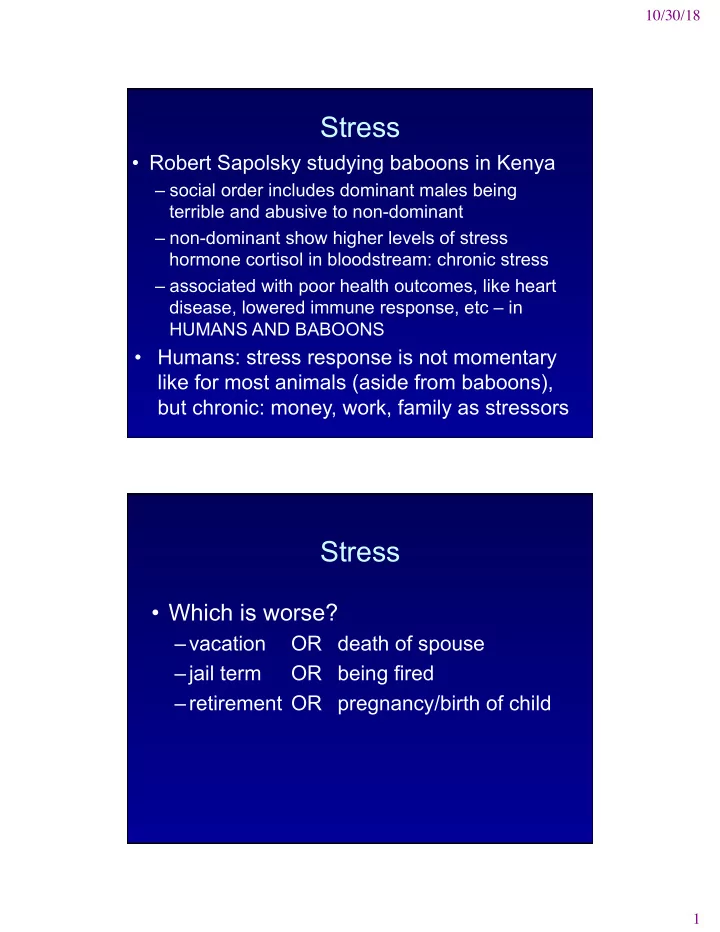

10/30/18 Stress • Robert Sapolsky studying baboons in Kenya – social order includes dominant males being terrible and abusive to non-dominant – non-dominant show higher levels of stress hormone cortisol in bloodstream: chronic stress – associated with poor health outcomes, like heart disease, lowered immune response, etc – in HUMANS AND BABOONS • Humans: stress response is not momentary like for most animals (aside from baboons), but chronic: money, work, family as stressors Stress • Which is worse? – vacation OR death of spouse – jail term OR being fired – retirement OR pregnancy/birth of child 1
10/30/18 Social Readjustment Rating Scale (SRRS, 1967) Life Event LCU death of spouse 100 divorce 73 marital separation 65 jail term 63 death of close family member 63 personal injury or illness 53 marriage 50 being fired 47 retirement 45 pregnancy 40 change in financial state 38 more arguments with spouse 35 change in work responsibilities 29 child leaving home 29 beginning/ending school 26 change in eating habits 15 vacation 13 Christmas 12 Health, Stress & Coping • Stress: the process of adjusting to or dealing with circumstances that disrupt, or threaten to disrupt, the course of a person’s physical or psychological functioning 2
10/30/18 Psychological Stressors • frustrating & pressured situations • daily hassles & conflict • life changes & strains • chronic stress • catastrophic events • boredom Issues in Stress Research • Universality • Predictability • Clear remedies • What influences the stress process 3
10/30/18 Stress Research Methodology • Limited to studying stress in naturally occurring environments (for ethical reasons!) • Types of stress measures: – Self-report • Social Readjustment Rating Scale (SRRS) – measures stress in Life Change Units (LCUs) • Life Experiences Survey (LES) – measures stress as perception of how intensely neg/pos events were • daily hassles – Behavioral – Physiological/Biochemical Stress Responses • Physical : General Adaptation Syndrome – Alarm stage • e.g., increased respiration, heart rate and blood pressure – Resistance stage • increased production of steroids – Exhaustion stage • final rallying of defenses (similar to alarm stage), followed by death/breakdown 4
10/30/18 Alarm Resistance Exhaust. • Psychological – emotional (e.g., anxiety, depression) – cognitive • loss of memory, difficulty concentrating • catastrophizing … dwelling on potential outcomes • Behavioral – strained facial expressions, shaky voice, posture change – aggression • Burnout & PTSD 5
10/30/18 Stress Mediators Stressor Stress Response Stress Mediators Stressor Stress Mediator Stress Response 6
10/30/18 Mediator: Cognitive Appraisal no “stress” challenge Stressor Primary Appraisal threat no “stress” Secondary Appraisal can cope “stress” can’t cope Other Stress Mediators • Social Support • Personality – Hardiness • similar to locus of control (internal vs. external) – Negative affectivity – Type A behavior • (Twice as likely to suffer from heart disease) 7
10/30/18 “Prescription” for Stress (AKA, How to make yourself a complete basket case in Three Easy Steps!) • Remember that worry is essential • No important task can be undertaken without it. • Tell yourself: If you’re not worrying, if things are going smoothly, if life seems easy, you’re doing something wrong. • Over-identify with everyone in your life. • When they get upset, be sure that you get upset. Absorb their worries and make them your own. • Do this with friends, co-workers, and family. • Also with the starving people of the world. • Remind yourself constantly: Life ought to be perfect. • Anything less is failure. • When something goes right, quickly remind yourself of all the things that are (or could go) wrong. 8
Recommend
More recommend